#expository sentences
Text
Eight Strategies for Improving Dialogue in Your Writing
Well, hi! Oh my… wow! It’s been a long time since I’ve posted! I’ve been very busy and I am genuinely sorry to all my followers, but that doesn’t mean I’ve forgotten about this account, but here is one final post for the year!
Hopefully next year I become consistent with it again!
Let’s begin!
One of the best ways to help a reader connect with your writing is by crafting excellent dialogue. Use these tips to learn how to write dialogue that showcases character development, defines your characters’ voices, and hooks readers.
Why Use Dialogue?
Good dialogue performs all sorts of functions in fiction writing. It defines your characters’ voices, establishes their speech patterns, exposes the inner emotions, and showcases their character development. Beyond mere characterization, effective dialogue can also establish the setting and time period of your story and reveal information in a way that doesn’t feel overly expository.
Authors use lines of dialogue to reveal a character’s personality and express their point of view. For instance, an archetypal football coach might speak in short, terse sentences peppered with exclamation points and quotations from famous war generals. By contrast, a nebbish lover with a broken heart might drone on endlessly to his therapist or best friend, speaking in run-on sentences that circle around his true motivations. When an author can reveal character traits through dialogue, it cuts down on exposition and makes a story flow briskly.
Eight Writing Tips for Improving Dialogue
The first time you write dialogue, you may find it quite difficult to replicate the patterns of normal speech. This can be compounded by the concurrent challenges of finding your own voice and telling a great story overall. Even bestselling authors can get stuck on how a particular character says a particular line of dialogue. With practice and hard work, however, lackluster dialogue can be elevated to great dialogue.
Here are some strategies for improving the dialogue in your own work:
Mimic the voices of people in your own life. Perhaps you’ve created a physician character with the same vocal inflections as your mother. Perhaps your hero soldier talks just like your old volleyball coach. If you want to ensure that your dialogue sounds the way real people speak, there’s no better resource than the real life people in your everyday world.
Mix dialogue with narration. Long runs of dialogue can dislodge a reader from the action of a scene. As your characters talk, interpolate some descriptions of their physical postures or other activity taking place in the room. This mimics the real-world experience of listening to someone speaking while simultaneously taking in visual and olfactory stimuli.
Give your main character a secret. Sometimes a line of dialogue is most notable for what it withholds. Even if your audience doesn’t realize it, you can build dynamic three-dimensionality by having your character withhold a key bit of information from their speech. For instance, you may draft a scene in which a museum curator speaks to an artist about how she wants her work displayed—but what the curator isn’t saying out loud is that she’s in love with the artist. You can use that secret to embed layers of tension into the character’s spoken phrases.
Use a layperson character to clarify technical language. When you need dialogue to convey technical information in approachable terms, split the conversation between two people. Have one character be an expert and one character be uninformed. The expert character can speak at a technical level, and the uninformed one can stop them, asking questions for clarification. Your readers will appreciate it.
Use authentic shorthand. Does your character call a gun a “piece” or a “Glock”? Whatever it is, be authentic and consistent in how your characters speak. If they all sound the same, your dialogue needs another pass.
Look to great examples of dialogue for inspiration. If you're looking for a dialogue example in the realm of novels or short stories, consider reading the great books written by Mark Twain, Judy Blume, or Toni Morrison. Within the world of screenwriting, Aaron Sorkin is renowned for his use of dialogue.
Ensure that you’re punctuating your dialogue properly. Remember that question marks and exclamation points go inside quotation marks. Enclose dialogue in double quotation marks and use single quotation marks when a character quotes another character within their dialogue. Knowing how to punctuate dialogue properly can ensure that your reader stays immersed in the story.
Use dialogue tags that are evocative. Repeating the word “said” over and over can make for dull writing and miss out on opportunities for added expressiveness. Consider replacing the word “said” with a more descriptive verb.
903 notes
·
View notes
Text
ok hopefully my phone doesnt die while i write this review of kung fu panda 4
bottom line is dont watch it its not good. all rhe dialogue is bad. as in both the actual words written in the script and the way the actors deliver their lines. there isnt a single sentence that doesnt come out extremely awkward and stilted. even jack black sounds like he doesnt want to be there and the thing about jack black is that wherever he is hes always happy to be there.
also i hope we can track down the person who decided awkwafina should be in every animated kids movie ever from now on and have them shot. and then also kill awkwafina i hate the sound of her voice more than anything.
honestly the movie is just really boring. its mostly expository dialogue for a majaority of the runtime and then the big fight at the end was pretty cool and i forgot that i hated the movie for a second cause at least it was entertaining.
i know this movie is literally for babies but the jokes are all EXTREMELY unfunny and feel a million times dumber. sometimes movies for kids can still be witty and genuinely funny to watch as an adult but this movies sense of humor was for 6 year olds and nobody else
somethings i liked:
there was PANGOLIN voiced by ke huy quan which would have been awesome if he was actually a good character
po's goose dad and bryan cranston panda dad were kind of yaoi. no they werent who said that
tai lung was resurrected to serve cunt for 30 seconds and then died again
36 notes
·
View notes
Note
hi!!! hopefully you are having a good day!!! but a quick question-
how can i give insight to a character's backstory without it look liking a word-dump?? especially if the whole story have a diary entry format.
Very good question that honestly really depends on your personal style, but here's what's worked for me.
The best advice I can give is to stop thinking of your character's history as "backstory." That's one of the words that's become so loaded in popular writing discourse as to not mean anything solid anymore, like "worldbuilding," "theme," "protagonist," etc. Words like that are helpful once you've made your own definition for them, but with so many voices in Youtube tutorials and social media posts all saying similar but different things for what these mean, it's best to find a word that better suits how you view the concept. For me, that word is "history," because like how the present is founded on actual history, our characters are only the product of their history. Characters, like people, rarely if ever operate in the present tense.
So--revealing history without the dreaded expository dump. To answer this, we first have to look at why expository dumps are so uninviting. Here's an example of it done poorly (I'm writing this as an example, not taking someone's writing to like, diss on them hah):
Cheryl took the elevator up all five floors of the haunted house, which groaned as she went, the elevator left untouched since the house's last occupants moved out. When they arrived at the penthouse suite, Doctor Gastor explained that the last residents here thought they were wizards and practiced daily at arcana. Their names were Abigail and Horace--he had renamed himself after a demon had told him his true name, so he claimed--and they wintered in this remote, northern sphere to avoid Italian summers. Horace was wealthy, Abigail poor, but he had found her in poverty and saw something of the occult in her movements, so he stole her away one summer, and the two found more in common than they would've thought, for they married the next year.
Cheryl paced the floor, picked up and dusted off a book titled in runic chicken scratch, and opened the cover."
This isn't the worst example I could think of, but it has the hallmarks I'm looking for. The first issue with this expository dump ("Doctor Gaston explained... next year") is that it shatters the flow of the passage. As a writer of narrative fiction, the goal of every sentence is to lead smoothly to the next sentence. To do this, we always have to be thinking of what the reader wants to read after a given sentence. If one sentence is about an elevator groaning in a haunted house, the reader probably wants to know how Cheryl reacts to it! Is she scared of ghosts? Does she believe in ghosts? Is she scared of elevators? If so, what does she do? Move to hit a button on the elevator to stop it? If scared of ghosts, how does she internalize this? If not scared, how does she internalize perhaps how Doctor Gaston is shivering? (Is he shivering?) These are all places the reader's mind wants to go to after that sentence. Instead, we get this history about some old wizards (if I had the patience, I would've made it longer to really make it intrude on the narrative, but I don't have the patience). If this is the first time the reader's hearing about the wizards, they probably won't care about them. This synopsis of their story interrupts what the reader actually cares about, which is whatever Cheryl cares about in the moment. To fix this interruption, Cheryl could find the book of runes maybe in the chapter before this, because that gets the reader invested. The reader, just like Cheryl, wants to know why there's a book of runes in the haunted house. So Cheryl asks Doctor Gaston about it, which legitimizes this exposition, because it's also what the reader wants to know.
Another major fault of info dumps is when they don't relate to the character at all. Cheryl's history (let's say she's a girl from the country who wandered into the house on accident) has nothing to do with wizards. Maybe in the narrative, she learns to cast some spells, which makes her care about wizards, but at this point, she doesn't. If Cheryl has nothing to do with wizards, or little to do with them, then why should the audience care? When writing a character's history, you should only include the parts that matter to the character. And this written history should never be too long, because you never want to stunt the flow of the piece (what "too long" means is up to debate and your discretion and style).
Also, exposition only works when it feels genuinely embodied by the character speaking. Is Doctor Gastor explaining the wizard history, or is that the author talking? Some of it sounds like Gastor (the bit between the em dashes sounds like what he would say), but the rest sounds like Gastor is only a mouthpiece for the information I want to put out.
So, solving it. One trick I like to do when giving exposition is to make the exposition into its own mini-scene. You don't want to write, "Carmen was friends with Piper, and they went to the dance once as friends." Instead, give it some space on the page:
She and Piper were the only girls in their group who had gone quiet at curfew. Beatrice’s only crime was in whispering comments in the early hours, short things to guide the group’s banter, never loud enough to warrant arrest. “Not really, no.”
“That’s nice.” Carmen nodded and drew his eyes across the crowd. “Did she sleep well?”
“Beatrice?”
“Yeah.”
“I guess.” The path turned up the steep hill on which the dining hall was built. “I don’t know. I don’t think anyone really slept well.”
“Oh.”
“It’s just uncomfortable, you know?”
“The girls?”
She raised an eyebrow. “And the boys aren’t?”
“No, they are.” He laughed, and Piper was dragged to the same laugh at Homecoming three months ago. She had requested for the Melpomene band’s recent concert recording to be played after the next pop song, and surprisingly, her request was approved. Carmen laughed as their poor performance boomed from the speakers, laughed at the disruption of a dance, and Piper laughed too. But within the minute, the concert’s strident ballad was supplanted by another chart-topping pop song. But for those forty seconds, music was displaced, and the dancers stopped; city walls fell; Piper had broken something for forty seconds, held power for forty seconds.
She said now, “It’s just weird, being here. It’s all too happy. Too clean.”
Exposition can work really well in brief flashbacks. And note how the exposition starts: a mirroring of "laugh" because the image is fresh in the reader's mind, so I take them on a sort of dream logic to the past. Note also that this is planting the seeds for some relevant character-building: Piper's growth into an independent woman--"Piper had broken something for forty seconds, held power for forty seconds." Here's another example from my current WIP:
He thought of Brynjar the day he had given him the knot. It was the spring of Óskar’s sixth year, and Brynjar had taken him to the docks one morning to watch sailing men fix fresh ropes on their karves and clip pulleys to sails to tie them to the boats’ sides.
“Never doubt a weaver woman,” Brynjar said, annunciating each word. “They keep everything afloat.”
“‘Floating,” repeated the young Óskar.
“If the ropes aren’t strong, a boat’ll flip and spin. Like this!” He lifted Óskar above his head and spun on his heels, and Óskar cackled. The father set the son on his shoulders and smiled. “Yes, we need those ladies.” Óskar felt his father’s shoulders raise, and he knew the man forged something witty in his mind. “It means, Óssie, a man is only as good as his woman. And you can tell your mother I said that.”
Eldrid, Óskar’s mother, would leave in her sleep later that year, and the witches would say she was sick, and Brynjar would spend some nights looking through the cracks in his home, remembering the gray wife he woke to that morning.
In his memory, Óskar did not know whether this new recollection of his mother’s passing tainted his father’s speech or if he really did turn somber, but all the same, a short silence paused the scene at the dock, and Brynjar coughed to break it. His voice was low now. “Dangerous,” he said, looking with eyes like the beads of a raspberry at the men on the dock, looking through them. His jowls lowered like curtains, forced low with the hill of a frown, and in the memory, his skin blued and bloated. “It’s dangerous out there, Óssie. Be safe.” He sniffed. “Be well.”
“Óskar?” Ingrid stole him. He breathed back into the world and saw now that the road had turned down and the rock wall had turned in, and they approached a strip of sea.
In addition to providing a character's history, this also fleshes out the world: the importance of women and boats, the dangers of the sea. Before the flashback, Oskar is thinking about a knot, so he thinks about the day he got the knot, which makes him think about sailing boats. At the end of the flashback, he thinks about the ocean ("looking through [the sailors]," so probably at the ocean), thinks about his father's skin if he drowned, and back in the present-tense, uh oh, Oskar is nearing the ocean. It all flows together; we're guiding our reader.
But these are only small exposition dumps, and sometimes, we need to convey much more information. You can subtly convey much more information than you realize through dialogue and description, because how a character talks and acts is guided by their histories. If a character is short-spoken, they may have had some interpersonal trauma that you can flesh out more when the time is right:
“No,” Sylvia whispered, trapping Chloe again with her stare, desperate. “I can’t sleep over.”
“Why not?” Jane asked.
“Mom says I have to be home by seven.” She looked down at her empty plate, at the crumbs from one slice of pizza.
“But you haven’t asked her,” Jane prodded.
She shook her head. “I did before.”
Still in disbelief, Jane asked, “What did she say?”
“She said I have to be home by seven.” She blushed. “And I can do whatever till then.”
“Oh,” Jane said. She slunk back in her chair.
Chloe turned back to her parents. “Can you call Jane’s mom?”
“Sure thing.”
“Thanks!” She swiveled back and, fingering the fruit Phoebe scrambled on her plate, decided to eat it later. She grabbed a second slice from the box. Moments passed as they ate in silence, Sylvia watching her plate, and the muffled television played something in the living room. Mom and dad laughed.
“I should go,” Sylvia said. She bumped the table as she stood, reciting, “Thank you for having me.”
Jane looked at the clock hovering above the front door. “It’s only six-twenty.”
“I need to go home.”
“Oh.” Jane stuttered. “I’ll see you next week!”
Chloe said the same.
“Thank you. See you.” She opened the door and slipped through. It clicked behind her. Chloe and Jane paused their gnawing and looked up at each other, sharing a thought. They hadn’t heard a car grumble on the gravel, didn’t hear anything drive by at all, and neither of them knew how close she lived. They scraped their chairs from the table and crept to the dining room window like characters in a Jones Bones movie, Jane thought. But when they pulled back the curtain, she was gone. No cars drove on the street, and the sidewalk was empty. A golden glare shrouded the street and surrounding houses as the sun lowered behind a roof.
Throughout this book (The Ghosts of Glass Lake, available now ;)), it's implied that Sylvia has a controlling and/or abusive mother. In this scene, Sylvia is curt and direct. You can almost feel the urgency behind her words, how she bumps the table as she stands, and how it almost sounds like she's rehearsed this exit. It's also implied that no one came to pick her up--she walked home, but neither Jane nor Chloe know where she lives, and neither does the reader. Maybe she walked home for miles because her mother didn't pick her up. You can get a lot of meat from implications!
But still, there are times when you just need a lot of dense exposition, usually near the beginning of a book when you need to describe the setting. My best advice, if you ever need to do this, is to keep it as brief as possible, and to pay extra attention to pacing/flow/tempo/whatever-you-want-to-call-it so it doesn't distract, doesn't feel like a chore:
The seventh and eighth graders of Carmen’s church spent one Saturday every winter at Camp Catechism. The campus set its roots in northern Michigan, breathed easterly winds from Lake Huron, and sparked to life as batches of middle schoolers arrived on midnight buses. Cabins formed a bivouac in a birch forest, and one mile to the east lay the lake and the curve of its horizon. It was frozen now, and the limbs of trees wavered slowly under snow, ice eating at chipped, white bark. The chapel the middle schoolers sang in now was a wide A-frame built and reeking of old wood. A low stage headed the room from which stood a pianist, a drummer, and a guitarist, a stage from which Roman Richards would soon discuss Ephesians. The dining hall was a short walk from everywhere and displayed from a wide window the canopy of the burdened forest, ossified waves, and the sun glinting unbearably against it all. Cups of hot chocolate were filled and refilled on a counter at the entrance of the dining hall, and campers drank these violently, abrading their throats as adolescent drunks. Boys and girls separated into two large halls subdivided into tight rooms for each youth group, everything barred entrance from the other sex. As a general rule, phones were banned, as were drugs, candles, and cursing, though the popular boys forged unique methods to circumvent these restrictions, and anyone caught with contraband was witnessed a martyr for a greater sense of vagrancy. Still, most campers lived within their rules, their obligations, just as they always had at church, and any rule breaking (“sin,” as Roman Richards claimed) was relegated quickly to myth, to rumors spread away from pious ears. As such, Carmen and his contemporaries were only loud ostensibly, never committing to a biblical criminal record.
This was not to say that anyone at Camp Catechism was reserved—they spilled everything about their lives to their youth group leaders, but no one yet could articulate exactly what they meant, exactly what they felt, and scantily of dreams, ambitions, or desires.
And as all good exposition does, it flows well back into the narrative. The last paragraph above is a bridge between the camp description and a look into Carmen's inner life.
You may also find halfway through your narrative that you need to dump a bunch of character exposition, and you need to do it urgently. My trick for this is to make chapter A flow into the exposition, chapter B be an extended flashback scene, and chapter C to pick up where A left off. For example, if you need to talk about a character's relationship with his father but haven't done that yet in depth, find an easy way to transition into a flashback chapter that does just that. It's an enlarged version of the flashback tool I talked about above!
Now, all of this is what's worked for me, and I write third person distant POV narratives. It sounds like you're writing first person close POV haha. So I don't really have any examples to help with, but the general advice to 1. Keep the pacing/flow/tempo/etc. so exposition doesn't distract, and 2. Write exposition only about what matters to the character, preferably only what matters to the character in that moment, then you should be a-okay. Exposition is only as bad as it distracts, and these are the strategies I've found to distract as little as possible and to use the exposition to meaningfully build my characters as much as possible.
And again, this exposition dump problem doesn't have hard and fast solutions. Every author deals with it in their own way, and I'm sure with practice, you'll find what works best for you and what comes naturally to you, just as I'm always discovering and refining what works for me. The advice in this post is, I think, a solid place to start from :)
#writeblr#writing#writing advice#writing questions#creative writing#fanfic#writers on tumblr#writerscommunity#writer#writers of tumblr
19 notes
·
View notes
Note
What should I do if I don’t like drafting? Or drafting feels like pulling teeth? I have brainstormed and I have my outline. It’s just completing this first draft that’s the problem.
My passion for the story dwindles a bit during first drafts. I know that’s not cool to say but that’s what I’ve noticed.
i think i'd need more context here. for example, do you hate drafting but love revising? did you used to love drafting and it's only become difficult recently? or do you just hate drafting, period?
for beginner writers, the first skill to be developed is verbal acuity. by that i mean, practicing sentence writing and paragraphing, which are skills taught in school only for expository writing but rarely creative writing. crafting sentences in fiction is a completely different skill than crafting sentences in any other genre, because you're largely developing scenes and therefore images, and that's a very hard thing to do for basically everyone. words are not images. words can only render a facsimile of an image.
if that's where you're at, my advice is to write very short stories or even poetry, so that way you can really develop a narrow focus on the sentences themselves. when you practice making sentences for long enough, they come a lot faster to you and drafting becomes easier (and more fun).
however, if you don't consider yourself a beginner and you still hate drafting, it's possible that you're in the wrong genre. if what you love about writing is making the story happen, and don't necessarily care about making it beautiful on the page, you might be happier writing scripts or plays. or if you're committed to prose, you can simply stop making scenes, and instead develop a kind of narration that allows you to summarize the events of the story (indirect discourse) rather than actually rendering them in sequenced events (direct discourse).
while i love a good scene, i've noticed that writers that begin in fanfiction tend to force themselves to write that way, where the reader imagines the story like a film, and you can hear the actual dialogue and see bodies moving in space. i think this has a lot to do with the fact fanfic is largely written with canons in visual mediums, and so our writing reflects that. in fact i think our writing reflects that so much that we can sometimes lose sight of the ability to simply narrate the events of a story however the hell we want.
i also wrote a post about how if you enjoy outlining but not writing, you can just keep outlining.
here's an activity: give yourself a stylistic constraint. write a story without any complete sentences, only fragments. write a story without verbs. write a story in bullet points. write a story in future tense. write a story where every sentence begins with "and then" or "he needed." write a story in imperative sentences. write a story that is only one extremely long sentence.
the point is to make exercises where your focus is attending to the sentences. when you outline a long story and sit down to write it the way it happens in your head, the pressure is too high. very few people can say "i'm going to write a book" and sit down to write a book. but a lot of writers can say "i'm just gonna fuck around a while with this one little idea i have" and eventually it turns into something.
37 notes
·
View notes
Text

I've been reading a new comic called Kattabolt, which is too new for me to review yet. It's a'ight so far, though. The art is very cute, the story is moving quickly, and it tags all the characters who appear on a page for easier searching, which is surprisingly rare in webcomics, so it's one of those comics I'm keeping an optimistic eye on. (wouldn't mind some keyboard navigation, though).
But I can't decide how I feel about "Your advantage over me is null" from firey teenage street thug Ray in panel 4 there. On the one hand, it seems kind of an odd phrasing, both in general and for the character of a street thug (though if we learn Ray is some kind of nerdy street thug than this is great foreshadowing).
On the other hand, it's fairly elegant exposition, where Ray is completely justified in saying something he and Nathan (the purple guy) both know, that trusts the reader to make some satisfying conclusions of their own. From those six words, we know that it's not just that Ray has fire powers and Nathan and Leigh (wait, the gang duo has rhyming names? That's cute) have water powers. There's this whole system of elemental powers, that have Pokemon-style type matchups, and that was the main reason Ray didn't jump to beating Nathan's ass until he had backup (as opposed to, say, Nathan being a kewl action hero). We can also deduce that if Ray, a bully, was nervous at a type disadvantage and didn't learn anti-Nathan lightning magic to deal with this recurring nuisance, then he probably can't do it, and this is an Avatar-style world where people can use exactly one (1) element, only unlike Avatar there's elemental weaknesses. That's really a lot of information to be able to glean from six words!
It's also a good use of genre convention. The magic system in Kattabolt is "Avatar with type advantage", which is a system that's very easy to understand. Kattabolt takes advantage of this tropey magic system to be able to explain the entire thing in a single throw-away line and get to the interesting part of the comic.
Y'know what, I think I've talked myself into it. "Your advantage over me is null" is a bit of a clunky line, but it carries a ton of expository weight and lets me catch on to the magic system myself instead of treating me like an idiot or pretending "kung-fu with elemental magic" is some kind of novel idea worth spending six pages explaining. And that's more than worth a single somewhat awkward sentence.
13 notes
·
View notes
Note
For the Random Writer Questions
Who’s your favorite character to write?
Who’s your least favorite to write?
Who’s your favorite character overall?
Which character(s) do you love to hate?
What’s the easiest thing to write for you?
What’s the hardest thing to write for you?
Do you plan everything out before you write or do you sit down and go with the flow?
Thanks for this ask, @dandylion240 !
Who’s your favourite character to write?
Victor Nelson. Definitely Victor. He always has a lot to say, and I can hear his narrative voice so clearly in my mind. I like his optimism and energy, and the fact that he's a genuine people-person. Plus, I just love him as a character/person.
Nikolai Pavlenko is another of my favourites, because of how many layers he has. He's a deeply sensitive person, but a lot of people don't realize that because he's typically so outwardly calm about everything. Nikolai can also be silly and hyper, which a lot of people who don't know him well also don't realize (because he's cultivated an outward calm for the public). He's the sort of character I'd love to get to know in real life.
Beth-Anne Jones is one of my characters I've really been enjoying writing recently. I can hear her narrative voice clearly too, and she's a no-nonsense sort of person who doesn't hold much back. Like Nikolai, she has a lot of layers, but unlike him, she hasn't cultivated a calm persona. Beth-Anne has a big presence, and everyone knows she's there.
*** Honourable mentions go to Kenji, Ginger, Félix, Haru & Eden
Who’s your least favorite to write?
Aidan (Senjirō) Okada. He's a brat and I dislike him.
Dylan Middleton - same reason
Who’s your favorite character overall?
lol you had to ask this one... Well, you probably won't be surprised if I say Victor, right?
Which character(s) do you love to hate?
Hana Okamoto & Ren Kitagawa - I mean, this is probably an obvious one, and I kind of hope other people love to hate them as well.
Anya Pavlenko - Because she is the literal thorn in Nikolai's side, and she does not care.
Dylan Middleton - Number One Brat
Aidan Okada - Number one brat #2
What’s the easiest thing to write for you?
Dialogue, but I really don't find expository writing particularly hard either, so... I don't know the correct answer to this question?
What’s the hardest thing to write for you?
The hardest thing for me to write is something short, I guess. I have no idea how people write like 2 sentences and call it a day. If someone can write a story section in 2-4 sentences and still have it be meaningful, that is a literal superpower in my opinion. People say I write too much, and they're probably not wrong. My goal is to make every word essential, and I feel like I need them all, but obviously there are people who are much better at making a few words count (no pun intended).
Another thing I find challenging is to write is visual descriptions of things. I can see just enough to make me realize that I can't see enough. I'm aware that there are visual details I often miss in real life, and I feel like that translates over to my pitiful visual descriptions, or utter lack of visual descriptions, in my writing.
Do you plan everything out before you write or do you sit down and go with the flow?
I'd say I fall somewhere in the middle of this. I do plan out what I want the story to look like with a beginning, plot actions, character growth, and an ending, but I'm not so meticulous as to make a detailed plan of how every little thing will go. I've been writing for a very long time, and if I've learned anything, it's that a well-developed character can't be forced into anything. If you're writing it and it feels wrong, then it probably is wrong and will need to be adjusted.
I've been known to twist my own plot because a character doesn't want to do something. (case-in-point: Dylan Middleton, who has had a drastic change of heart about parenthood, once the reality of it kicks in. I had to adjust a side plot quite significantly to accommodate that).
And then there's stuff like We Are Sugar Valentine which isn't even a real story in my opinion. It's just a series of loosely-connected vignettes with no actual plot. Some of it is canon to my characters and some of it, I'm just making up as I go along... and having it become canon
13 notes
·
View notes
Text
ten first lines
@queenofbaws tagged me thank you :* let's see what we've got
rules: list the first line of your last 10 (posted) fics and see if there's a pattern.
Stop. Talking. 'The consorts are fighting again.'
Helpful, in a Heterodyne Sort of Way 'No.'
Twist the Knife Zog had never been one for airships.
Ruined “You ruined him!”
Summer's Heat in Winter's Heart Guillermo liked the park, he really did.
Whatever it is People Go Away For It began—no, it ended—the beginning of the end was Laszlo entering the living room, where Simon was sitting with his feet on the coffee table, and saying “I heard something interesting today.”
Rosary Beads "Guillermo?"
I Accept “Wait—Wait, you’ve decided to get married but you don’t know who you’re marrying?”
A Change in Perspective The witch tilted her head back and smirked, her eyes half-lidded and dark with contempt.
Would You? "Guillermoooo."
Ok this was actually fascinating and it made me go through a few more of my fics to confirm. While there are a handful that open with longer expository descriptions, I do tend to start my writing with a short hook -- a single sentence, usually dialogue! I guess I think of a hook as something designed to pull you in quick haha
[Now I kind of want to do the same thing with the last sentence to see if there are patterns there, too lol]
tagging @jay-auris @phasmama @theherocomplex and all my other writers I can't think of right now!!!!
3 notes
·
View notes
Text
writing patterns (tag game)
I was tagged by the lovely and talented @msculper so go check out Mack's list if you want something to read! Most of the selection looks delicious as ever. 💕
rules: list the first line of your last 10 (posted) fics and see if there's a pattern!
Following Mack's example, this is most to least recent.
"In the time it takes to get to Kimpo, Hawkeye fools himself into thinking he's come to terms with never seeing anyone from the 4077 again." -- That's All There Is.
"As they ride the elevator down to the lobby, Peg reaches over and straightens BJ’s tie for him, an impish smile on her face." -- mergers and acquisitions (or, a night to remember).
"By the time CJ wakes up on the morning of Inauguration Day, the sun is already coming up outside, early morning sunbeams starting to creep across the floor." -- Make the Leap.
"Charles slowly unbuckles his belt as Donna watches, her mouth dry." -- Marked.
"At the end of BJ's first day in Korea - the end of the longest day of his life, it feels like - he sits down to write a letter to Peggy." -- who will you turn to tomorrow.
"On a dreary morning in early May, Peg puts on her second-best dress (from before the war), and a rain coat that is starting to fray at the hem, and takes the bus downtown." -- Close to the Heart.
"One of the best things about being a reporter, Danny has discovered, is the unexpected places he’s ended up in the course of his career, the moments in time he’s managed to capture with the stroke of a pen, history with a byline attached." -- (Born to be) National Treasures.
"When Annie finds her, Hallie is standing at the railing, watching the waves and tapping her foot to the music." -- more than just a game for two.
"It’s late enough by the time CJ gets home that the moon has risen and in fact has already started to set over Washington, a chilly October wind that tastes of the coming winter whipping around the hem of CJ’s coat." -- Fight or Give.
"It’s close to last call, and the restaurant is nearly empty, a few patrons finishing their meals to the sound of piano music and the distant laughter and music from the pool deck." -- Two for the Road.
MAN! Do I ever like expository opening sentences 💀 setting the scene works, I guess! I need to start dropping people in, in media res style, I guess. Anyone have writing advice for creating a different type of opening?
And this is a bit of a cop out, but tagging any of my writer friends who feel the urge to laugh at any patterns (or applaud yourselves for not sticking to a pattern! That's cool too). 💜
6 notes
·
View notes
Text
Here are ways to write a thesis for a research paper
You will need to write a thesis statement that is appropriate for the type of paper you are writing. Here is how to write the different kinds of thesis statements:
Argumentative Thesis Statement:
The argumentative thesis statement identifies your topic, position, and reasons for taking that position. you can use it when you are Making a claim. You can use a thesis Generator tool to create an argumentative thesis.
Analytical Thesis Statement:
Your analytical thesis should describe the topic of your paper, what you analyzed, and what conclusions you reached as a result of your analysis. It should be used when you are Analyzing an Issue.
Expository Thesis Statement:
You should formulate a thesis statement for your expository paper that states the topic of the paper and summarizes the key points of the paper. Best works when Explaining a Topic
Here is a checklist you can follow to make your thesis easy and on point:
A typical thesis may take anywhere from 2 to 3 months depending on your research area and time availability.
It would be good to start early and to keep writing short reports of every experiment you do or every discovery you make.
Keep your research work organized to avoid remembering what to write for each experiment.
Make several backups of your thesis data. Keep an up-to-date backup in some cloud storage (Dropbox, Google Drive ).
Give proper citations wherever necessary. If you are taking a figure or picture from someone else's work, cite them. Whether consciously or unconsciously, avoid plagiarism.
The thesis statement should appear somewhere in the first paragraphs of the paper, usually as the final sentence of the introduction.
Read through each chapter for grammatical errors once you have written all the chapters.
Whether academically or not, give credit to those who helped you. It is the best way to show your appreciation. In your acknowledgment, include a few sentences.
For your reference you can also go through this article Thesis Writer to help you learn to write in academic contexts.
#research#assignment#textbooks#organization#programs#statistics#publishing#publication#blogs#scholarly#writing#writers of tumblr#academic writing#academic papers#university#study#essay#education
47 notes
·
View notes
Note
8 and 23, please :)
For the 2023 fic writer round-up:
8 Did you write for a new fandom or ship this year?
I wrote a fic for the Emma (Jane Austen) fandom called Midnight Tea as part of the Trick or Treat Exchange! Emma and Mr. Knightly investigate a possible haunting, and sit down for some cozy tea with the "ghosts."
23 Share the final version of a sentence or paragraph you struggled with. What about it was challenging? Are you happy with how it turned out?
These two paragraphs from Transatlantic, an epistolary Ralph/Laurie fic, started out as an essay about Laurie's religious beliefs and the Charlot incident. You can still see traces of the essay in it --it is very expository. I ended up reworking the phrasing and then writing a whole fic around it (and taking full advantage of the epistolary format).
"But while we are on the subject of artifice: the context for those reflections in my last letter is a long story best shared once you are back. For quite some time now, I've had a gut intuition that I’ve been slowly spinning out into logical thought in the back of my mind, and it is this: I believe man invented God to serve man. The purpose of Catholic confession is to make peace with oneself. And for most people, this requires a confidant, someone to listen and to absolve one of one’s guilt. But ultimately, the one person who can absolve us is ourselves. I wish I had realized this sooner. There was a French chap evacuated along with us at Dunkirk. He was in a terrible state of agony when he passed. I think I could have made it better for him if I’d had the clarity of conviction I have now.
I guess I am technically an atheist, but I still consider myself a Christian. For me, religion is the "flock" to which one has chosen to belong, not what one believes in. I had approached the war in this way too –I hadn’t thought too hard about why I enlisted, only that it was what one did in those circumstances. After I received my package at Dunkirk, I had time and motivation, for the first time in my life, to think about these things as matters of choice rather than immovable circumstances of life. And I think I realized at the time, though I wasn’t ready to admit it even to myself, that I did not believe in the existence of God. In fact, I had for most of my life operated under the assumption that no one else believed either. The church is real, morality is real, prayer is real, but I thought we all knew that God wasn't really real. And we all just carried on with religion because we are Christians, like the way we carry on with England because we are English --its the fabric holding society, all of us, together. If I were to fill out a form today, I’d still put down CoE under "religion". I still find comfort in attending service, in the rituals of worship, in the religious foundations of our civilization and way of life. When I shared these ideas with Alec the other day, he was baffled by my continued participation in Christianity despite my atheism, but I have a feeling that you’d understand."
2 notes
·
View notes
Text
Hollywood blockbusters, Star Wars included, favor expository dialogue:
“They fly now?”
“A communications disruption can only mean one thing: invasion.”
Expository dialogue, aka “Thanks, Captain Obvious”, does little to serve a story. Audiences are more savvy than you think, so there’s no need for a character to explain what’s already been done or what can easily be deduced from circumstance. Arguably, there’s no need for a character to even explain what they are thinking. If presented well, the audience will catch on.
This is the essence of show not tell. It’s an acquired practice and it’s taken some time for Star Wars to find writers skilled in it.
Consider the first three episodes from season one of The Mandalorian. Dialogue takes a seat behind action and body language. Add to this the mystery of not knowing the face behind the Mandalorian’s helmet. What results is compelling storytelling. In three episodes we become hooked on this new character because of what he does. Not what he says.
Andor likewise shows instead of tells. Its dialogue is efficient, even intentionally constricted in Cassian’s case. But it works. Kino screams, “No one is getting out!” and we instantly grasp its full weight. Not just for him or the men in his shift. Not just for the Narkina-5 prison population. In one short sentence we realize that no one, neither prisoner nor free person, is getting out of the Empire’s grasp. In fact their only way out - the “one way out” Kino later tells the prisoners - is to rebel.
Such meaning from such limited dialogue. That’s the power of showing. I sincerely hope Star Wars continues to write this way for future projects.
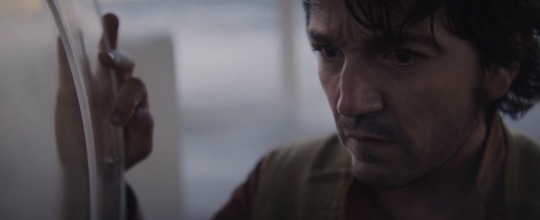
22 notes
·
View notes
Text
Kage no Jitsuryokusha, Episode 16
Yay another episode of one of the few decent OP main character anime!

What does this mean who even starts a conversation like that.
So she's Alpha's sister, Betatrix Beatrix, huh.
The right person, at the wrong time, won't answer that question, though, so better luck next time I guess.
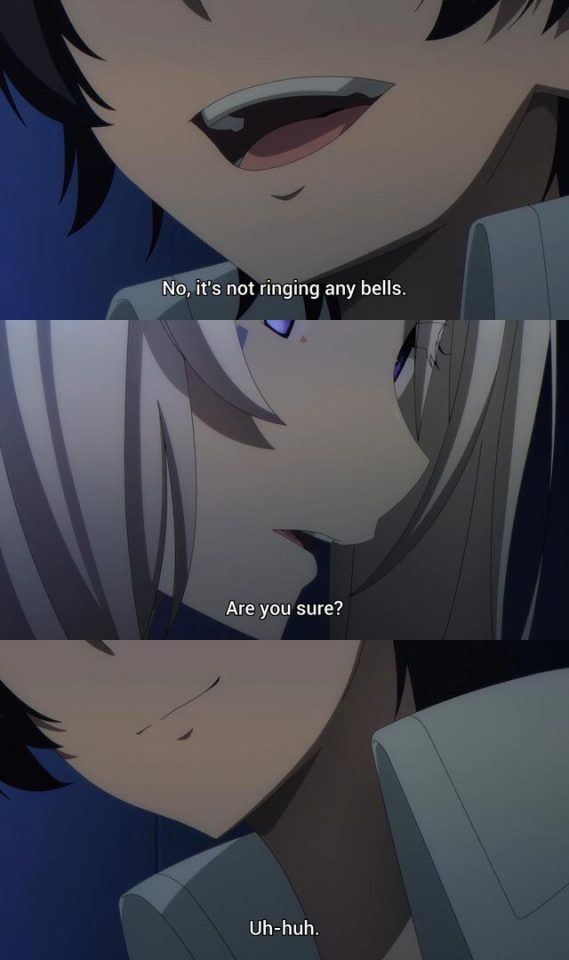
He lied as naturally as he breathed.
I love how the sound makes the scene looks so stressful like Cid made a huge mistake by lying so boldly, but it's Cid so he just goes do Cid things.
SHE REALLY STOPPED THE SWORD RIGHT BEFORE IT CUT HIS NECK!!! Good ol' template used between strong characters who remain unfazed when someone is about to kill them but Cid disarms it with his encyclopedic nerd knowledge impressive identity-hiding skills.
When she sheathed her sword it looked like food getting ready in a microwave. PLING!
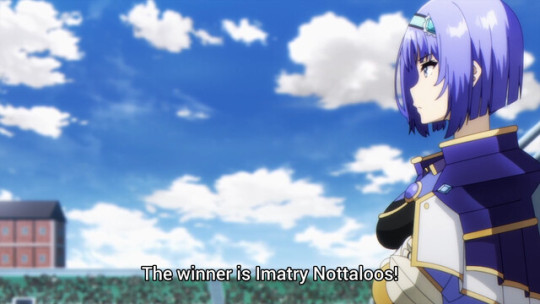
Imatry Nottaloos still trying I see! Good job!!!! Wait is he going to be in the finals???

that, uh, that's his lef

okay.
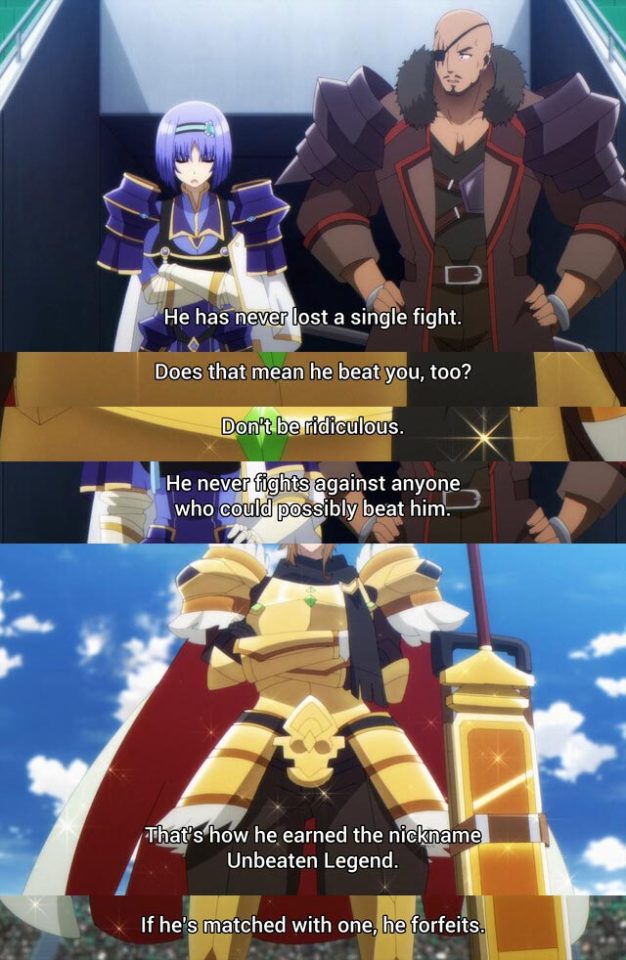
Sasuga.

It was in that moment the Unbeaten Legend realized he miscalculated the power levels.
The dude with the eyepatch couldn't see what transpired.

THIS IS A GOD DAMN EXPOSITORY CHARACTER!!! SITTING IN THE AUDIENCE OVER EXAMINING THE CHARACTER'S EVERY MOVE AND NARRATING IT SO THE AUDIENCE GETS HOW AWESOME THEIR SECRET BATTLE TECHNIQUE CHINITSU TOITOI SANANKOU SANKATSU RINSHAN KAIHOU IS AND ALL!!!
And eyepatch dude doesn't believe all this secret technique mastery at all!
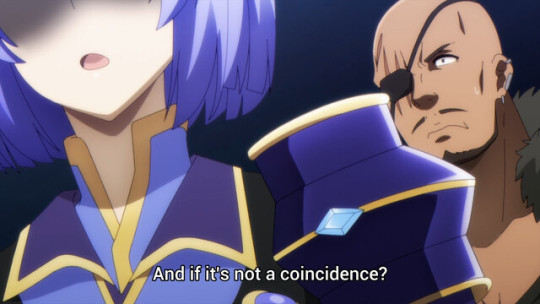
He doesn't believe it at all!!!!
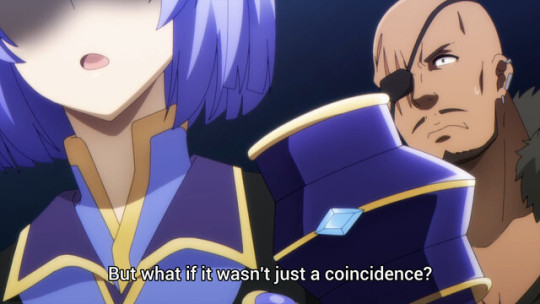
She said this two times because it was important.
AND HE STILL DOESN'T BELIEVE IT!!!111 If Cid knew this he would be ecstatic!!!!

His power level is getting to dangerous low levels. If it goes to 0 and still goes lower the power level counter will bug out and he will appear so harmless that people will actually be afraid of how harmless he looks.

MY GOD THEY SPENT LIKE TEN MINUTES JUST ANALYZING THE DUDE'S TWO MOVES WHY DO I LOVE THIS SHIT SO DAMN MUCH!!!!!!!!
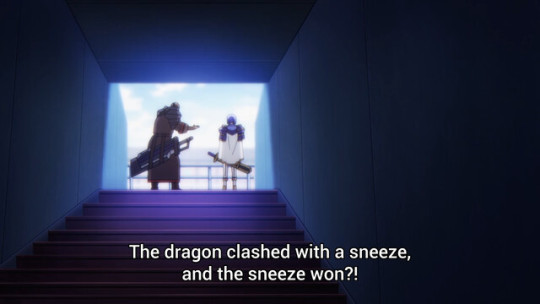
It was the sneeze of a god.

She has good eyes.

>does something extremely embarrassing in public
>scurries away with tail between legs
Oh my gah!
She just like me!
She just like me fr!!!!
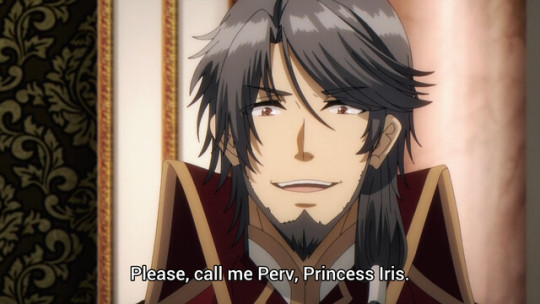
Who the fuck is this hot guy? He looks like a vampire pretending not to be a vampire. Look how pretty this fucker is. This isn't whom I imagined Mr. Masochist Asshat at all. I thought he would be one of those fat ugly sleazy lip-licking nobles who went "gueh heh heh" and groped his fiancée's only to get a well-deserved stab. This isn't according to the template at all!!!

Please do not gamble, become an idol otaku, frequent hostess clubs, or become a glutton.

THIS IS THE LINE THE BAD GUYS SAY YOU KNOW!!! WHY YOU SAYING IT!!! YOU'RE THE, err one of the, HEROINES YOU KNOW!!!

Dude was totally waiting for this to happen.
HE PULLED A ROCK LEE? HE PULLED A ROCK LEE!!!! HE PULLLLLEEEEDD A ROCOKCKKKKKE LLEEE!!!!!!!!!!!!
respec.
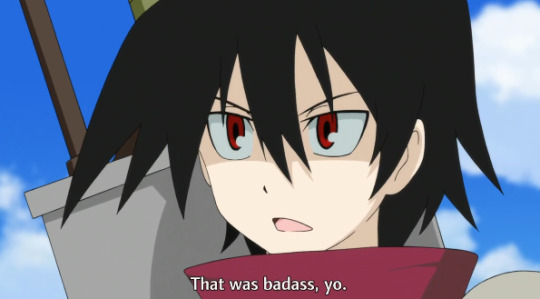
We're finally at the finals, huh.
I wonder if Imatry Nottaloos made it.
I hope he made it.
I think that, generally with anime, you can tell how good the direction is by its use of the soundtrack, not whether the OST itself sounds good, but how it fits each scene and cut, because sound track is probably a bitch to match right, there's tempo and everything, and that probably requires a lot of the skill of the coordinator positions up in the chain.
So anyway this is a series that handles that well. Very well, in fact. Because it uses the soundtrack in a sarcastic way befitting of the anime. All the chuuni scenes where Cid is deliberately acting mysteriously and saying sentences thoughtlessly that sound profound have the perfect "mysterious scheming going on" feel to it. Despite the fact that Cid is in control of everything even if blissfully unaware of almost everything the show is full of thrilling and tense sound effects because it's composed from the viewpoint of the "mob" characters.
What plays when Goldy fights Mundanne isn't the song of Cid easily slapping a fly. It's the boss BGM. Mundanne is the boss.
12 notes
·
View notes
Note
Hi Sky! I’m so excited to get to you as a writer (and read more of your stuff). 💕 3,10,19 for the ask game.
Hi Sailor!! Thank you so much for dropping in my ask box! I'm really excited to get started on your request, it means a lot that you would trust me with it. I hope you're having a lovely day/evening wherever you are in the world! ☺️💕
3. What makes you love writing?
Truthfully I just love writing because I love spending hours penning down my daydreams. Sometimes just imagining isn't enough, I need to have it memorialized in writing. I don't usually go back to reread my fics so I just assume I enjoy the process of getting to create that world and that story with my own fingertips and moving on to the next.
10. Which patterns keep popping up in your characters/projects?
I am a very expository heavy writer. I like dialogue, and I don't think I'm bad at it. Snarky fun quips and surface level conversations are great! But I find I prefer to describe the surroundings as well as the characters actions in as much depth as possible to make you really feel and understand the setting. This is an ongoing theme in pretty much everything I write (even some hcs).
You can see this in Unspoken Words. My reader is mute, and I think it's because I subconsciously wanted to focus on the actions and thoughts of the reader instead of dialogue heavy scenes. Not to mention I always see Levi as a man who shows his love through gestures, looks, and intentions. It just works out for me. ☺️
Also I do tend to either go for a shy, sweet reader or a sarcastic, fun reader. Hm, also eyes and mouths! I do like to focus on facial features especially the eyes and mouths.
19. Do you plan out your projects? If yes, to what level? How well do you stick to your plans?
Oh man. If you asked me this a couple months ago I would have said, "I don't really!" Deadass I used to just jot down basic notes like "reader and Levi go on a drive" and "it's late at night" and "they kiss on a cliff somewhere" and then call it a day lmfao. You'd be surprised but 80% of my writing is off the cuff.
I know this isn't the question but my writing process involves me envisioning the scene/story like a director behind the camera lens. I'm just dictating where things go and how they happen as I see it. So I don't really have planning, things just happens as I write.
It is to my detriment as I am a very slow writer because of it, not to mention the overwhelming anxiety of it.
LATELY I've incorporated my own messy way of @humanitys-strongest-bamf outline technique. I'll literally write a short sentence for each paragraph/couple of sentences to convey what I want to happen and then move on to the next as I'm visualizing the story. It has helped my writing TREMENDOUSLY. Who knew preparing something would make your life so much easier? 😅
For example for my elevator kissing scene, I'd write something like: "Levi looks at you before pushing you up against a wall" and then move on to the next scene.
send me a writer's ask!! 💕
5 notes
·
View notes
Note
sem how do you better your writing over time? like deepen your vocabulary and make your sentences sound more smooth and better constructed than your last ones ? cause you improved a LOT in ur work!! do u have any tips?
i use onelook.com for synonyms!
also i try to keep my sentences short because i know i can let them run on and on.
whenever there’s an action or directional/physical shift in the narrative, i start a new paragraph to center that moment.
dialogue is important for breaking up multiple expository paragraphs & it can add to the plot without using expository paragraphs. use dialogue to reveal feelings, to hide feelings. literally one line of dialogue can wipe out an entire paragraph of you explaining and writing the same exact point. however, dialogue and exposition work together, not against each other.
also remember that you can come back to your passed works and refresh. something published now on tumblr can always be edited and reblogged again later.
31 notes
·
View notes
Note
Hi Betts! I recently read through most of your writing tips masterdoc (it was a fun read!) and I have two questions (if you don’t mind).
1. Do you have any craft books that you recommend on drafting, editing, or other aspects of writing fic? I know there’s something to be said for practicing writing and not just reading about it, but I really enjoy the craft books I’ve read, and I was wondering if you knew of any great ones!
2. When is a sentence considered “imagery” rather than “expository?” I was trying an exercise you recommended and I got a little stuck with this bit because sometimes directly explaining something (like a setting or action) also conjures a concrete image. I might also just have trouble with this because I don’t normally visualize much when I read 😅
Thanks for all the work and writing you put into the world!
for your first question, you can check out my craft essay a day series. i also have a book recs tag. one of these days i'll finish my craft book list on bookshop dot org and when i do, i'll link it in my newsletter as a new resource.
as for your second question, i can't remember the specific exercise you're referring to, but i think there's a lot of overlap between expository prose and imagery. (i'm sorry if i conflated the two in that post or wasn't clear.)
exposition has two meanings:
in film theory, it's the information given early in a script to set up the characters, conflict, and stakes.
it also refers to any writing that explains something. academic writing, manuals, and this post are all examples of exposition. when i say exposition, i mean it in reference to explaining something in prose.
because of the pervasive "show don't tell" adage in writing, exposition in fiction is generally (and wrongly) frowned upon. explaining things is "telling" the reader, when many writers believe you should be "showing" the reader. but like all writing rules, it depends on the context, and because it's so context dependent, it really doesn't work as a rule.
(i write more about my thoughts on "show don't tell" in this post.)
in some ways, you can see all fiction as expository, because it's exposing the facts of a story. but when most people say expository prose, they mean infodumping, or explaining your story to the reader rather than rendering it. and generally they mean this to be a bad thing, which is ridiculous. sometimes you just gotta explain stuff.
imagery is similarly complicated. take the sentence, "there was a table in the room." you the writer are explaining via your narrator that there was a table in the room. but because the table is an object, an image is naturally conjured. if you were to change that sentence to, "a table stood in the room," to make it active (or even "he saw a table in the room"), it makes no meaningful difference in the image, although many would say that the active form of the sentence is stronger.
which is all to say, exposition and imagery can definitely bleed into each other, and in the case of certain sentences there's no discernible difference.
13 notes
·
View notes
Text
Emotionally looking for NSFW 21+ partners!
Greetings!
30yr f, looking for 21+ long term or short term partners who are looking for NSFW please. I've been roleplaying for the last 10yrs throughout different fandoms. I started on tumblr but have since moved onto discord.
Writting Style
Depending on my mood I try to get as much out in each reply. I can go from a few paragrphs to a few sentences, it's always different. I'm open to 1x1 and double ups. I rp as canon and OC, whatever we decide together. I can be persuasive, narrative, expository, and descriptive. I'm honestly very explorative and love different things all the time so it's constantly changing how I write for others. Mainly I write first-person view but I can go third-person if that's what the other prefers. I you're literate, semi-literate, multipara or novella, that's fine. I'm very open and accepting of other's styles. I'm both a fluff and angst writer, enjoying both ways, and I'm heavy with smut. I don't really have many limits. Happy to discuss more together.
Pairings
Main pairings are f x m however I'm open to m x m and f x f.
Fandoms
As stated I've done and still doing many fandoms at the moment, however I'm mainly posting this to find partners for the Transformers fandom as they're a little tricker to find. I've only just started to rp through transformers but I've been a big fan for many years. Below are the franchises I'm interested in, along with the characters.
. RotB - Mirage and Noah.
. Earthspark - Bumblebee and Breakdown.
. Prime - Any Character.
. Bayverse - Soundwave or Barricade.
. G1 - Any Character.
. Crossover ( I'm obsessed with these and there's not enough fanfiction of it )
If interested send me a message and we can discuss more together. Looking forward to hearing from others. Thanks!
6 notes
·
View notes